Loved, hated and read a lot - Thomas Mann is one of the most important German writers of the 20th century. But during his lifetime he polarized:he was too intellectual for the conservatives, too German for the left and too bourgeois for his fellow writers.
Strict father, exotic mother
The author Alfred Döblin wrote that he raised the crease to an art principle – but in the end it is above all his bourgeois nature that makes Thomas Mann a bitter opponent of what he sees as the barbaric Nazis.
Even Nobel Prize winners start modestly:Thomas Mann, born in Lübeck in 1875, had to complete a lap of honor three times during his school days. Even in the subject of German, he never gets beyond "quite satisfactory".
His father is particularly concerned about this. The highly respected Lübeck merchant stipulated early in his will that the company should be dissolved upon his death. He simply does not believe that his two eldest sons, Heinrich and Thomas, are capable of succeeding him.
Thomas Mann's mother is different. The daughter of a German emigrant grew up in the midst of Brazilian sugar cane plantations until she was six. As an enthusiastic pianist, she understands her children's artistic ambitions.
Thomas Mann recognized early on that his parents' legacy points in two such different directions as his life's theme and processed it in literature - most obviously in the novella "Tonio Kröger" from 1903.
There, the young Tonio already felt excluded from the "bliss of ordinariness", the everyday life of the clever and able-bodied. He becomes a writer and yet longs for bourgeois respectability:"As an artist, one is always adventurer enough inside," says the novella. "Outwardly you're supposed to dress well, hell, and behave like a decent person."
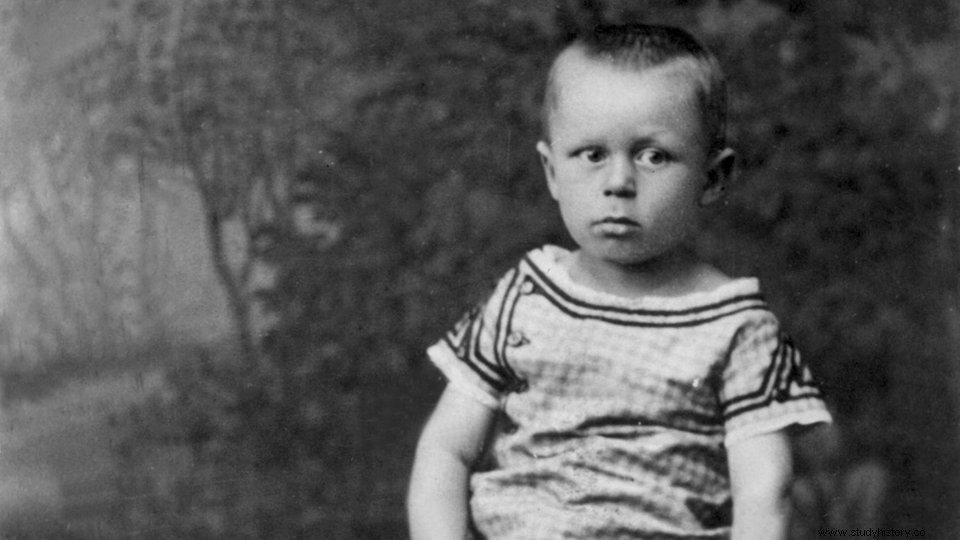
Thomas Mann at the age of six
First success, then marriage
Thomas Mann is also wildly determined to be decent. Thanks to the inheritance of his father, who died in 1891, he was able to hold a suitable court even as a young writer. Since the success of his first novel "Buddenbrooks" from 1901, he has financed himself entirely from his own resources.
In 1904 he dared to take the next step towards a middle-class existence:despite his homoerotic tendencies, he courted Katia Pringsheim, daughter of one of Munich's wealthiest families of scholars.
The marriage in 1905 marks the beginning of a fulfilling everyday partnership for life. Katia will have his back until his death - and so self-sacrificingly that her letterhead doesn't have her own name on it, but "Frau Thomas Mann".
The fact that her husband keeps eyeing young men - according to Thomas Mann a purely aesthetically motivated crush - doesn't seem to bother Katia. If one believes the descriptions of the six children, the parents' marriage must have been a happy one.
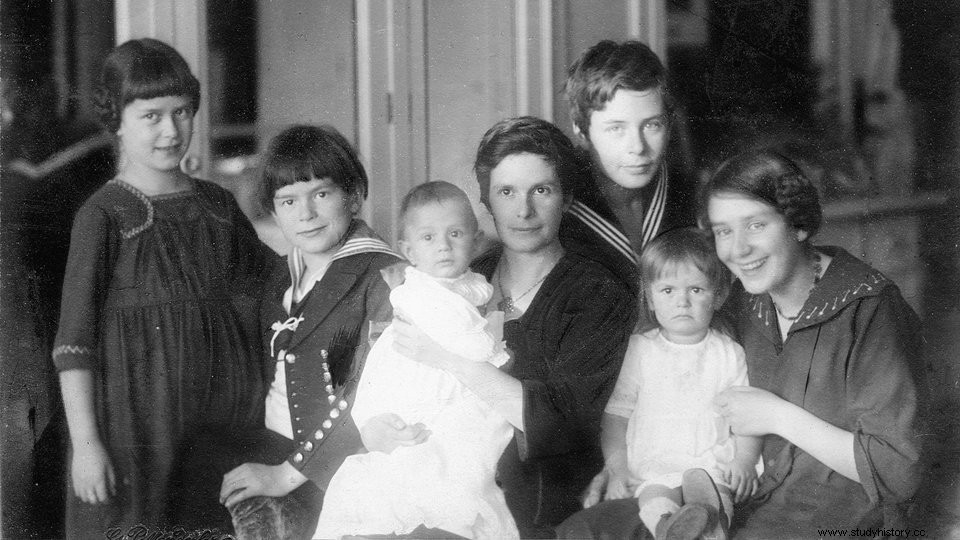
Katia Mann surrounded by her children
Brotherly quarrels and thoughts of war
Shortly before the First World War, Thomas Mann was brilliant. His royalties even enabled him to buy a Munich city villa on Poschingerstrasse, affectionately called "Poschi" by his children.
Because of the war, however, he breaks with his brother, who is also a celebrated writer:while Heinrich Mann openly speaks out against the war, Thomas takes the side of the proponents.
He explains his reasons in his major essay "Reflections of a Non-Political Man" published in 1918 at the end of the war:Western civilization and its values of freedom, equality and democracy are incompatible with German culture, with introspection, depth and tragedy.
Germany must fight for a special path - for a conservative-authoritarian state that can assert itself as something independent between the democracy of the West and the socialism that is emerging in Russia.
With his speech "Of the German Republic" in 1922, Thomas Mann reversed this attitude and became a supporter of Weimar democracy. Whether it was based on honest insight or on calculation is still controversial then as it is today. The only thing that is certain is that his "observations of an apolitical man" did not bring him the response he wished for among national conservatives, but instead angered many liberal-minded.
In 1929, however, his greatest success came:Thomas Mann was awarded the Nobel Prize. However, the official justification only mentions the "Buddenbrooks", not his "Magic Mountain" published in 1924 – a serious insult for the artist.
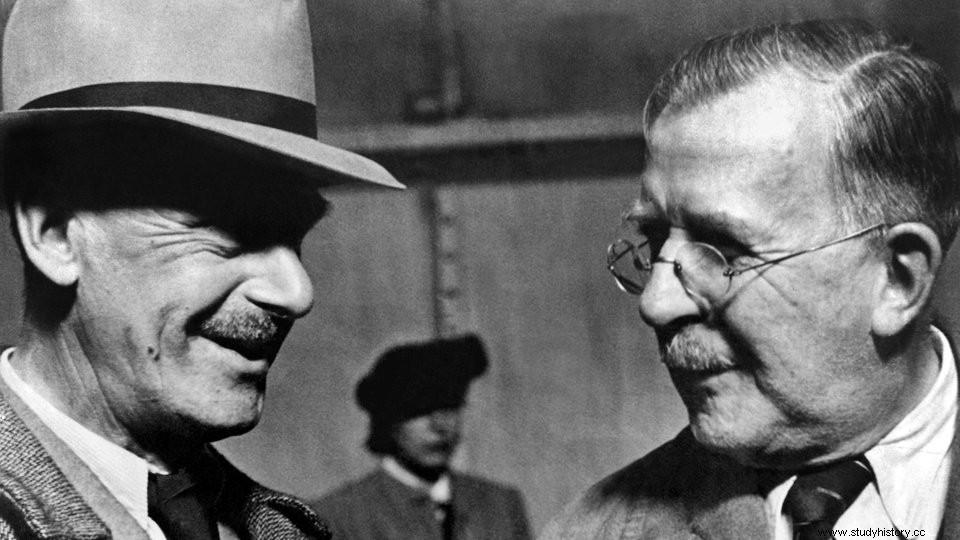
Brother, friend, competitor:Thomas (left) and Heinrich Mann (right)
Flight into exile
At the award ceremony in Stockholm, a journalist advised the Manns to leave part of the prize money abroad. Only four years later, they have to watch as the Nazis rob them of fame and reputation, then large parts of their wealth and finally even their citizenship.
In the spring of 1933, shortly after Hitler came to power, Thomas Mann decided not to return to Germany after a lecture tour of Western Europe. After a few detours, he settles in Switzerland.
In exile he feels uprooted and repeatedly suffers from depressive moods. His main antidote is his rigid daily routine:every morning at nine he withdraws for three hours to write. After a walk and lunch he researches for his current project.
After tea and siesta he takes care of the correspondence, and after dinner he recites the lines he wrote in the morning to his wife and family. Above all, Thomas Mann's work owes its existence to iron discipline, not to the sudden flashes of inspiration of a genius.

The work keeps him alive:Thomas Mann 1936
"Where I am is Germany!"
Finally, in 1938, Thomas and Katia Mann moved to the USA. Upon arrival, he appears combative again for the first time. When asked by a reporter whether he felt exile as a burden, he defiantly replies:"Where I am is Germany! I carry my culture within me and don't see myself as a fallen human being."
Since 1940 he has been calling on the Germans to resist in monthly radio speeches. The British Broadcasting Corporation (BBC) broadcasts the programs in Mann's old homeland - via long wave and thus bypassing Nazi censorship.
At the same time, he begins work on his novel "Doctor Faustus". The book was published in 1947 and tells of the pact between the composer Adrian Leverkühn and the devil - a furious reckoning with all those traditions of German culture that made National Socialism possible in the first place.
However, this radical self-exploration does not go down well with the Germans. After the end of the Second World War, the exile was denied the ability to judge life under Hitler at all. The Germans will take it amiss for a long time that he responded to the bombing of German cities with the succinct sentence "Everything has to be paid for".
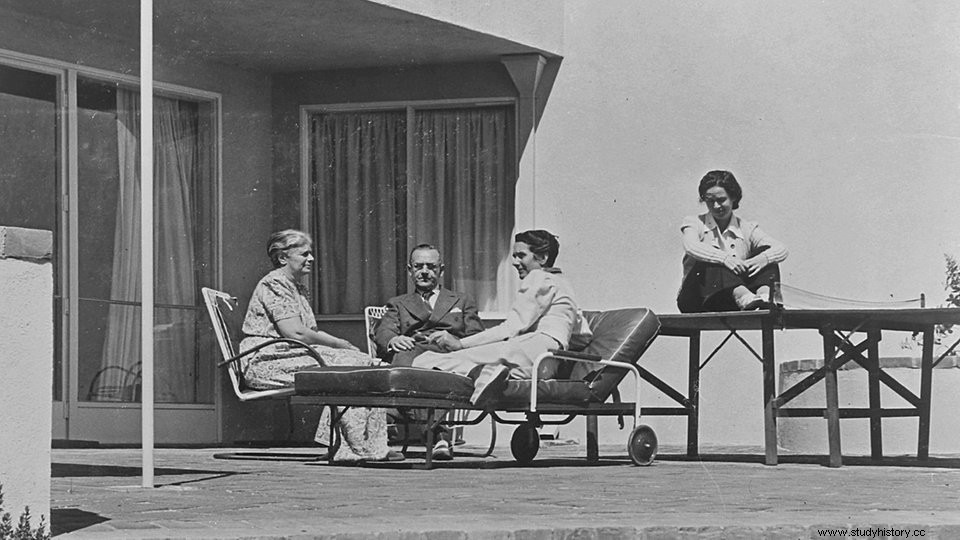
Finally arrived:the Mann family in California
Educated citizens without a home
Thomas Mann does not want to return to either of the two German states – but to Europe. Because in strictly anti-Communist post-war America, even he, an educated man through and through, has to answer to a "Committee for Un-American Activities" as a supposed sympathizer of the Communist Party.
Soon after, he settled again in Switzerland. Finally, on August 12, 1955, Thomas Mann died at the age of 80 in the Zurich Cantonal Hospital from a ruptured abdominal artery.
What remains of an author whom friends, colleagues and enemies sometimes affectionately, sometimes contemptuously, call "great writer"? To this day, his books are a pleasure to read, but that may also be due to the fact that his narrative style always seemed a bit old-fashioned even during his lifetime. In the chaotic, violent 20th century, he once again struck the leisurely tone of the great epic poet.
On the other hand, his inflexibility towards the Nazis will remain undisputed. For Thomas Mann, this attitude was always a question of his Germanness - a question about the abysses, but also about the self-healing powers of German culture.
"Thomas Mann is German in a way, as if he were in Africa," as the Hungarian writer Sándor Márai once put it. "He wants to keep the German in him alive a little while at the same time hurting it to death. It's possible that he's not quite the ideal German, but he's definitely the most honest one."
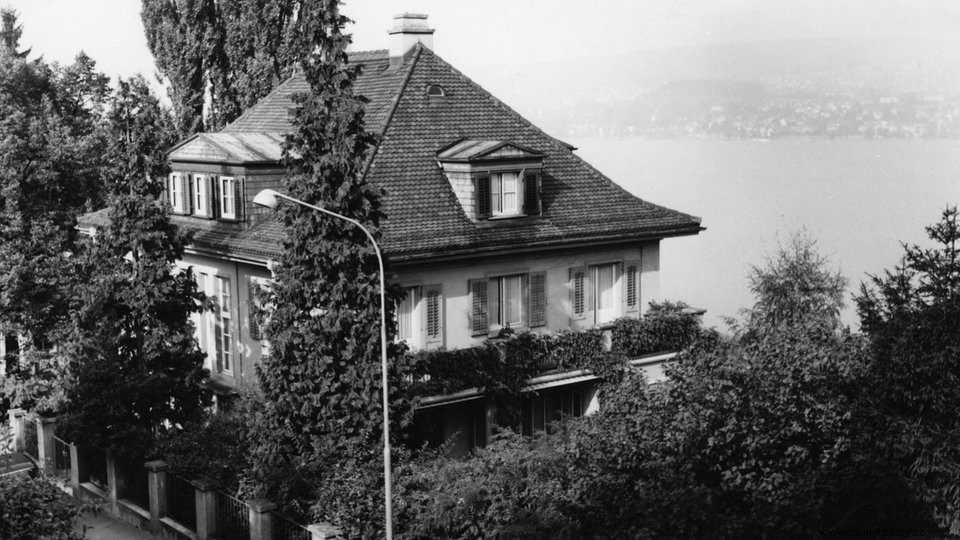
Thomas Mann spent the last years of his life in this villa on Lake Zurich
